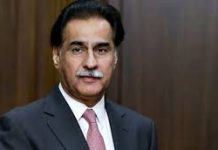From Abid Usman
LAHORE: Prime Minister Shehbaz Sharif has directed for the early finalisation of the Electric Vehicles Policy 2025 in consultation with all the stakeholders.
He issued these directives while chairing a high-level meeting in Lahore on Saturday to review the policy framework for the promotion of the electric vehicles industry in the country.
During the meeting, the draft of the Electric Vehicles Policy 2025 was thoroughly discussed.
The prime minister emphasised the need for swift and priority-based measures to promote electric motorcycles, scooters, three-wheelers, cars, and buses across Pakistan.
He also underscored the importance of setting up charging infrastructure, including charging stations and battery swapping facilities, to support the expansion of the EV ecosystem.
Furthermore, the prime minister instructed that relevant industries should be facilitated to enhance the local manufacturing capacity of electric two-wheelers and three-wheelers.
The meeting was also attended by Federal Ministers Rana Tanveer Hussain, Ahad Khan Cheema, Muhammad Aurangzeb, Special Assistant Haroon Akhtar, and other senior government officials.
Earlier, Power Minister Sardar Awais Leghari has inaugurated the country’s fastest Electric Vehicle (EV) charging station in Islamabad, the state broadcaster reported, as Pakistan moves to enact reforms of the energy sector designed to boost demand.
The government approved the National Electric Vehicles Policy (NEVP) in 2019, setting a target of 30 percent EVs by 2030.
“EVs are the future of Pakistan and the government is committed to promoting green energy,” Radio Pakistan quoted Leghari as saying on Tuesday as he inaugurated a 120kW EV charging station, which enables faster charging than standard residential chargers (3-7 kW), allowing EVs to recharge typically within 30-60 minutes.
Leghari also said the cost of electric charging units had been reduced from Rs71 to Rs39 [$0.14], which was expected to lower transportation expenses, positively impacting goods delivery and essential commodity prices.
Earlier this year, Pakistan announced a 45 percent reduction in power tariffs for electric vehicle charging stations. The government is also planning financing schemes for e-bikes and the conversion of two and three-wheeled petrol vehicles.
According to a report submitted to the government by power ministry adviser Ammar Habib Khan and seen by Reuters, there are currently more than 30 million two- and three-wheeled vehicles in Pakistan, which consume more than $5 billion worth of petroleum annually. The ministry plans to convert 1 million two-wheelers to electric bikes in a first phase, at an estimated net cost of 40,000 rupees per bike, according to the report, saving around $165 million in fuel import costs annually.
BYD Pakistan, a partnership between China’s BYD and Pakistani car group Mega Motors, told Reuters in September that up to 50 percent of all vehicles bought in Pakistan by 2030 will be electrified in some form in line with global targets.
In January, China’s ADM Group revealed plans to invest $250 million in setting up an electric vehicle manufacturing plant in Pakistan.



